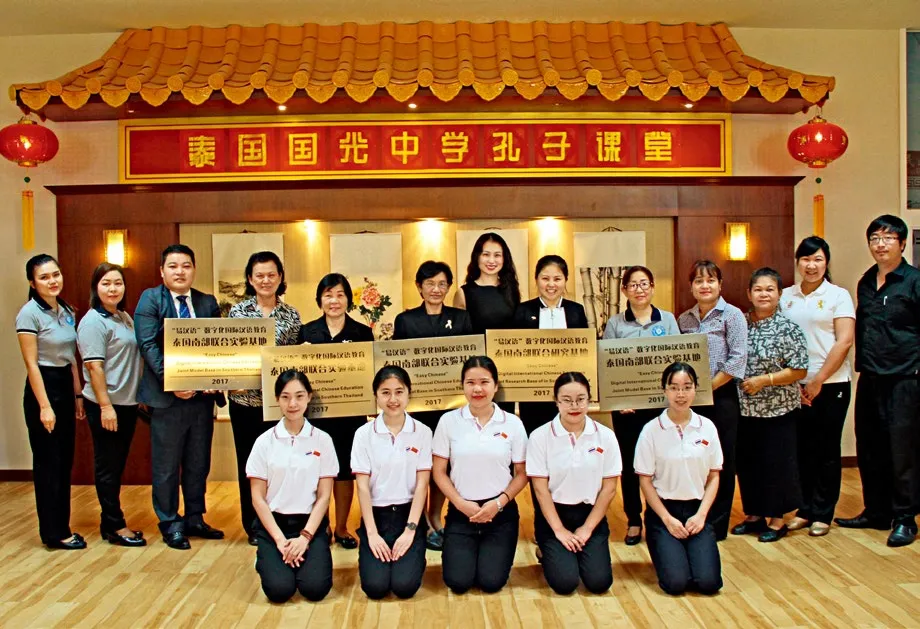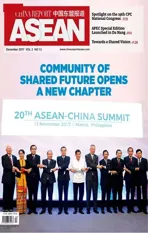FILM A POWERFUL VEHICLE OF CULTURAL EXCHANGE
2017-11-22ByWangJiping
By Wang Jiping
Recent cinema exchanges between China and ASEAN member states have helped improve cultural understanding across borders
FILM A POWERFUL VEHICLE OF CULTURAL EXCHANGE
By Wang Jiping
Recent cinema exchanges between China and ASEAN member states have helped improve cultural understanding across borders

China’s CIBN Film and Thailand’s Greatest Entertainment have announced plans to co-produce three TV series.
Cultural and educational exchanges have long played an important role in promoting people-to-people understanding between China and ASEAN member states. With the implementation of the Chinaproposed Belt and Road Initiative,the two sides have deepened their cooperation in the fields of culture and education, building a stage for showcasing unique beauty of different countries and strengthening friendly exchanges between people in China and ASEAN countries.
TV and Film Production
Every country has its own lifestyles and national sentiment,both of which are accurately captured by its TV and film productions. TV shows and films are also one of the most popular forms of cultural exchange between nations. In recent years,China and ASEAN have made fruitful achievements in TV and film co-production as a channel to boost cultural cooperation.
From First Love (2010) to Bad Genius (2017), Thai movies have enjoyed high popularity in China. They provide young Chinese people with a window to understand their Thai peers’thoughts and feelings. Many Chinese moviegoers believe that these movies have helped bring the peoples of the two countries even closer, as they highly resonate with intriguing stories and great emotion. Similarly,Chinese movies shot in Thailand,such as Lost in Thailand and Detective Chinatown, have also boosted local tourism.
To strengthen Sino-Thai cooperation in TV and film production, CIBN Film was established by the video website OCTV under the China International Broadcasting Network in Bangkok this February. With the help of new technologies, new media and new resources, the company is engaged in facilitating and deepening cooperation between Chinese and Thai TV stations,production companies, video sites and social networks. CIBN Film has also made active efforts in content creation and dubbing projects, building a new platform for video content cooperation between the two sides.
At the same time, China has launched productive cooperation with other ASEAN member states.Supported by both the Chinese and Malaysian governments, a historical movie Road to Dawn premiered at the Great Hall of the People in Beijing in June 2007. According to then Chinese Ambassador to Malaysia Cheng Yonghua, the movie is of both strong political significance and high artistic value. Cinema is a popular art form, and co-production has not only promoted cultural exchanges, but also opened up a new cooperation area between China and Malaysia.In May, an agreement on holding the Belt and Road Film Cultural Festival and the Asia Rainbow TV Awards in Malaysia next year was signed, pushing Sino-Malaysian cooperation in TV and film production to new heights.
Singapore is another important partner of China in this area. In September, New Culture Media Hong Kong Limited, a subsidiary of China’s Shanghai New Culture Media Group, signed a memorandum with Singapore-based mm2 Entertainment and Shanghai 9i Film & Television Media. Their cooperation is aimed at resource integration, movie production and market expansion in China,Southeast Asia and other regions.
Education Cooperation



Above left: A poster for the Thai movie Bad Genius.
Above center:Cast of the Thai movie Bad Genius on a promotional tour in China.
Above right: The“Easy Chinese”digitalized Chinese education joint research base was unveiled in the Confucius Classroom at Srinakorn School in Hatyai,Thailand, on June 3, 2017.
With people-to-people understanding constantly being enhanced, educational exchanges have become a highlighted area of China-ASEAN cooperation.Burgeoning Confucius Institutes in Southeast Asia have not only helped Laos, Thailand and Cambodia with top-level talent cultivation, but have also promoted cultural resource sharing and youth exchanges.
According to statistics released by China’s Ministry of Foreign Affairs at a press conference prior to the Belt and Road Forum for International Cooperation this May, a total of 136 Confucius Institutes have been established in 65 countries involved in the Belt and Road Initiative, and 94 of them were set up by the Chinese side. ASEAN member states are home to 31 Confucius Institutes,the most among any set of countries along the route.
The rapid development of Confucius Institutes has been warmly received by Southeast Asian countries. Cambodian Prime Minister Hun Sen spoke highly of the work by the Confucius Institute project.
“The establishment of the Confucius Institute fits the needs of the Cambodian people in understanding and partnering with China,” Hun Sen said. He also stressed the importance of learning Chinese by saying:“Speak Chinese, then you can make friends all over the world”.
In addition to the joint development of Confucius Institutes, student exchange programs have also played an active role in promoting peopleto-people understanding between the two sides. At the opening ceremony of the 14th China-ASEAN Expo and the 14th China-ASEAN Business and Investment Summit held in Nanning, China’s Guangxi Zhuang Autonomous Region, in September, Chinese Vice Premier Zhang Gaoli noted that in 2016,nearly 200,000 Chinese and ASEAN students were studying in each other’s countries, and the two sides are striving to reach the goal of achieving 300,000 students involved in exchange programs by 2025. He also proposed that in the future,China and ASEAN will make joint efforts to further improve their student exchange programs,explore new cooperation models in culture, sports and healthcare and facilitate close exchanges by giving full play to a China-ASEAN think tank network.
According to Wang Huiyao,counselor of the State Council of China and president of the think tank Center for China and Globalization (CCG), youth exchanges between China and ASEAN are of great necessity and significance because the young generation is the future of any country and young people are expected to carry forward traditional friendship between the two sides. Both the Confucius Institute project and student exchange programs provide a channel for young people to communicate with and learn from each other.
